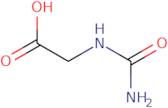Hydantoic acid
CAS: 462-60-2
Ref. 3D-FH167828
| 5g | Descatalogado | ||
| 10g | Descatalogado | ||
| 25g | Descatalogado | ||
| 50g | Descatalogado | ||
| 100g | Descatalogado |
Información del producto
- (Carbamoylamino)Acetate
- 2-(Carbamoylamino)acetic acid
- 2-Ureidoacetic acid
- Acetic acid, [(aminocarbonyl)amino]-
- Carbamoylglycine
- Glycine, N-(aminocarbonyl)-
- Glycine, N-carbamoyl-
- Glycoluric acid
- Hydantoicacid
- N-(Aminocarbonyl)glycine
- Ver más sinónimos
- N-(Carboxymethyl)urea
- N-Carbamylglycine
- N-carbamoylglycine
- NSC 49417
- Urea, (carboxymethyl)-
- Ureidoacetic acid
Hydantoin is a reactive molecule that has been shown to be a good antibacterial agent against bacterial strains. Hydantoin is also an anti-inflammatory agent, with the ability to inhibit the production of prostaglandins. Hydantoin is an intermediate in the synthesis of many hydantoates, such as heparin and salicylaldehyde. It is a part of many transfer reactions, such as those involving glycosidic bonds and amide groups. Hydantoin also participates in transcriptional regulation by binding to DNA at specific sites on the chromosomes. The sodium salt form of hydantoin has been shown to inhibit viral replication.





